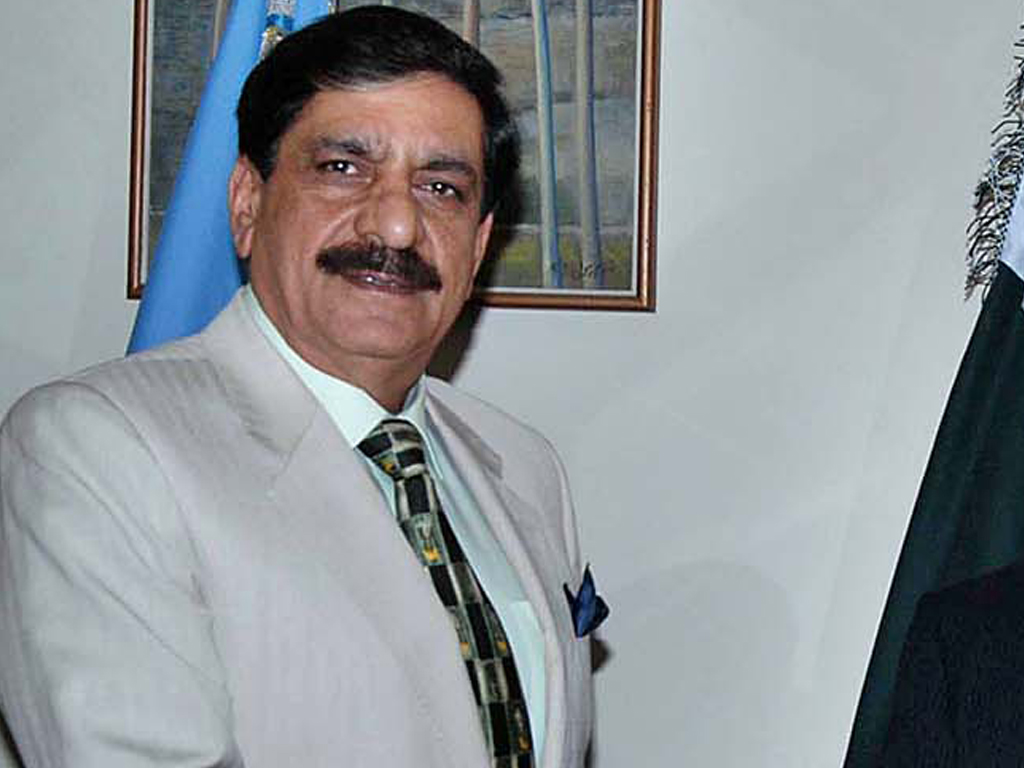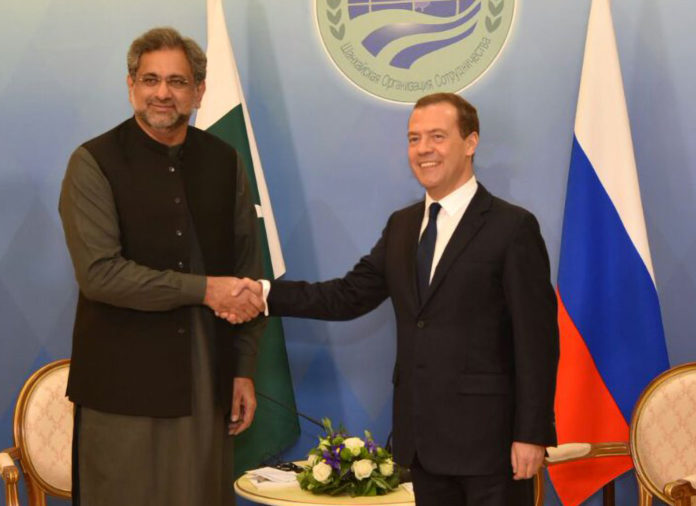Pakistan has offered Russia a ‘multidimensional strategic partnership’ on the eve of the 70th anniversary of their diplomatic relations. Pakistan’s foreign office said on May 01: “We believe that long term multidimensional strategic partnership between the two countries will be mutually beneficial for the people of Pakistan and the Russian Federation and would contribute towards regional peace and stability”. So far, President Putin has twice put off his visit to Pakistan, citing lack of preparation to make the visits meaningful.
Since then, a lot of mileage has been covered by the two sides. Thanks to arrogant American behaviour, soon after aligning with the US after 9/11, Pakistan realized that the US would abandon it at the first available opportunity. Hence, Pakistan has been making a concerted effort, at least since 2005, to diversify its untenable one-way critical dependence on the US. It planned for a slow and steady transition rather than a sharp cut off from the US and avoided the instant proverbial embrace of the ‘Bear’.
Even though numerous recent developments have seen Pakistan-Russia relations explore new avenues, the US still continues to have abiding influence amongst the Pakistani State and Society. Pakistan’s military leadership and policy level politicians and bureaucracy feel that it is not tenable to cut off from the US. For decades, America has been investing heavily in these leadership echelons, who are now paying back by retarding the process of Russia-Pakistan rapprochement. This nexus first made Pakistan critically dependent on the US and now, mischievously, cites the same as main reason for maintaining good (read subservient) relations with the US no matter the cost in terms of nation’s respect and pride.
Budgetary support from the US, accounting for around 20 percent and access to hi-tech military equipment have been the main incentives for remaining engaged with the US. However, over recent years, American civil and military aid has dropped significantly around 40 percent making it easier for Pakistan to extend its offer to Russia. America’s decision to cancel supply of six F-16 war planes to Pakistan in 2016 under Indian pressure, came as an eye opener for apologists. President Donald Trump’s erratic policies, especially his new year eve’s Pakistan bashing tweets have, to a large extent, disarmed the pro-America constituency in Pakistan.
However, one should not expect that the US would easily cede space for Russia, for Pakistan there will be a price for each step towards Russia in the form of direct and oblique pressures a series of such irritants have already begun to hit Pakistan where it pains the most. Likewise, it is difficult for Russia to untangle from India any time soon, despite India’s fast-moving alignment with the US.
Notwithstanding the above, relations between Pakistan and Russia have already seen an unprecedented improvement in recent years in the fast-changing regional scenario that compelled both countries to align themselves to protect their mutual interests. Pakistan has now expressed its desire to take the relationship to the next level. The move is seen as significant and a clear shift in Pakistan’s approach. The shift is essentially necessitated by America’s hard-line approach towards Pakistan.
Over the years, as American influence has been diminishing, Russia has moved closer to Pakistan offering energy deals, military partnership, infrastructure development, etc. The relationship is fast evolving into a mature partnership and relations between the two are now characterised by considerable roll back of mistrust, commonality of interests, and convergence of views on important regional and global issues. The two countries have similar stakes in durable peace and stability in their shared neighbourhood; and both harbour shared aspirations for regional development and prosperity. An upwards trajectory is being maintained through sustained high-level interactions via strong institutional mechanisms and cementing cooperation in such diverse fields as trade and commerce, banking and finance, agriculture and industry, defence and security, education and technology, and energy and infrastructure development, etc.
The two countries have also collaborated closely at international forums including the UN. Russia has been a strong supporter of Pakistan’s membership of Shanghai Cooperation Organisation (SCO) at a time when even China was reluctant to expand the SCO. Now this platform provides another meaningful podium for close regional cooperation on matters of common interest.

Pakistan now views Russia as an important global power, a significant development partner, and a salient contributor to regional stability. Pakistan, Russia and China appear to have developed consensus on some of the regional issues including Afghanistan. They want a negotiated settlement of the lingering conflict in Afghanistan. As American influence over Pakistan is in for a nose dive, Russia is building military, diplomatic and economic ties that could upend historic alliances in the region and open up a fast-growing gas market for Russian energy companies.
Pakistan values enhanced ties with Russia in balancing the US influence. However for now Moscow-Islamabad rapprochement is at best in its infancy. So far it is China doing the heavy lifting to fill the growing void left by the US. Some mega level energy deals and meaningful military cooperation could stimulate life into the Russia-Pakistan relationship. So far, it is just a beginning, both countries have to work through the past to open the door to the future. Russian overtures to Pakistan offer a badly needed diplomatic lifeline as the latter faces growing friction with Western powers.
Both Russia and Pakistan are also alarmed by the presence of Daesh in Afghanistan, which has a potential to expand its operations into adjoining Central Asia and South Asia, even though it may appear on its fag end in the Middle East. The two countries have announced plans to establish a commission on military cooperation to combat the Daesh threat in the region. Both have common ground on most issues at diplomatic levels and the relationship has the potential to grow substantially. There is an agreement to continue annual military training exercises that began in 2016 and followed the sale of four Russian attack helicopters to Pakistan, as well as the purchase of Russian engines for the JF-17 fighter jets. These developments have been watched with unease by India.
During the last two decades, the close Russia-India relationship has been unhinged by huge arms sales by the US to Indian. “If the Russians start backing the Pakistanis in a big way at the political level, then it creates a problem for us,” said Sushant Sareen of the Delhi-based Observer Research Foundation. India’s foreign ministry is of the view that its own relations with Moscow have stood the test of time, and that the two nations are building up defence and energy relations, including collaboration on nuclear reactors in India. Pakistan is now eager to build alliances closer to home with the likes of China, Russia and Turkey. It wants to correct the imbalance of its foreign policy. Pakistan is not divorcing its relationship with the US and its allies, it wants to attain a balance, by being closer to its friends in the region. The cooling relationship with Washington have already foreclosed other options, pushing Islamabad closer to China and Russia.
Pakistan’s military, which has historically been heavily reliant on US weapons and aircraft, may have no choice but to ramp up purchases from Russia which it had been looking down upon in the past as inferior hardware incorporating low end avionics.
From the Russian perspective, Pakistan is among several nations that have been courted by Moscow after their falling out with Washington, others are the Philippines and Qatar, etc. As yet, Russia’s long-term aims and objectives for its relationship with Pakistan are unclear. Apparently, Russia is of the view that Pakistan is a ‘geo-strategically important’ country and “it is keen to expand its existing military-to-military cooperation”. Russia has time and again acknowledged Pakistan’s achievement in the fight against terrorism and contribution for regional peace and stability. While Washington often down plays Pakistan’s critical role, Russia thinks otherwise and has said so publicly. Trump has time and again accused Pakistan of supporting and harbouring Afghan Taliban. Russia along with China, however, came to Pakistan’s help by suggesting that shifting the blame on Pakistan would destabilise the region. Russia was one of the first countries which publicly expressed its solidarity with Pakistan after President Donald Trump unveiled a new strategy for Afghanistan and South Asia.
Pakistan has been pushing for a regional consensus on Afghanistan. Russia, China and Iran have endorsed Pakistan’s stance that the use of force will not resolve the lingering conflict in Afghanistan. All the regional players believe that the only way to achieve peace could come through an Afghan-led and Afghan-owned peace process.
Russia is coming in very fast on the energy side. As of now, Russia and Pakistan are negotiating potential energy deals worth in excess of $10 billion. Russian companies are in talks to build an oil refinery and power stations but the biggest deals focus on gas supply and infrastructure. Pakistan is one of the world’s fastest growing liquefied natural gas (LNG) import markets. The North South pipeline would be the biggest infrastructure deal by Russia since early 1970s, when Soviet engineers constructed the Pakistan Steel Mills industrial complex.

The flurry of exchange visits suggests a new push by both sides to diversify their foreign policy options. Relations between Pakistan and Russia have seen an unprecedented improvement during last few years. On the invitation of Nikolai Patrushev, Secretary of the Security Council of the Russian Federation, a high-level Inter-Ministerial delegation led by Lt Gen (R) Nasser Khan Janjua, National Security Adviser (NSA) visited Moscow on April 22-23. This was the first-time that inter-Ministerial level delegations led by NSA of the two countries met each other. NSA of Pakistan gave an elaborate presentation to the bilateral forum on trends of global power politics. He shared his strategic thinking about evolving security challenges around the globe with particular focus on the region. He also highlighted the common opportunities for Russia and Pakistan, “Regional connectivity and prospects of closer cooperation in the fields of space, defence, security, economy & trade, cyber security, intelligence-sharing remained the main focus of the delegation level talks. Both sides expressed their satisfaction at the positive trajectory and progression of mutual relationship at bilateral and multilateral levels including SCO and the UN“.
Over the past two years, Indian and pro-Indian commentators have argued that Pakistan is “diplomatically isolated.” This claim has less to do with reality and more to do with the fact that isolating Pakistan is an Indian foreign-policy goal. In September 2016, Indian prime minister Narendra Modi referring to Pakistan, declared: “We will isolate you. I will work for that.” And within weeks, sponsored op-eds began appearing in Indian media asserting that Pakistan had been diplomatically isolated. In reality, Pakistan was never diplomatically isolated; and it certainly isn’t today. With the breakdown of unipolarity it is rather hard to isolate a country. There are just too many options.
The current offer made by Pakistan for developing strategic ties with Moscow is a positive and significant step that will enable both countries to come closer to each other and build a strong partnership based on shared interests. Hopefully, Moscow would welcome the offer. Construction of infrastructure under China-Pakistan Economic Corridor project has also opened a window of opportunity for Moscow to use it as an alternative route to access the Middle Eastern countries. It can also invest in the special economic zones, as these are open for all. Opportunities for cooperation between the two countries are diverse. It will be a historic milestone in relations between the two countries if Russian President Vladimir Putin also visits Islamabad, which is long overdue.




